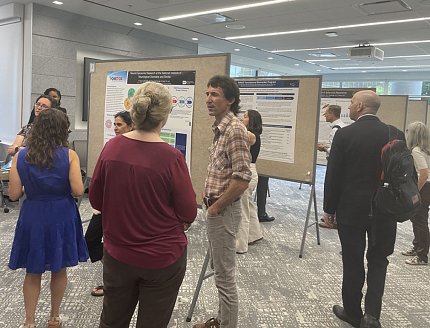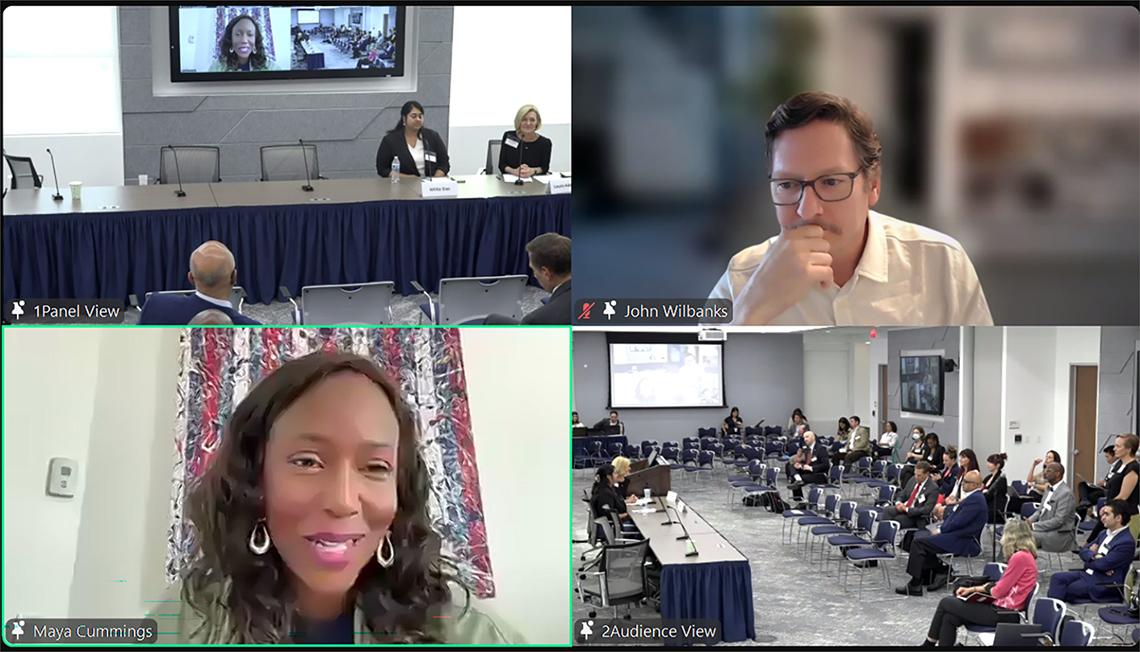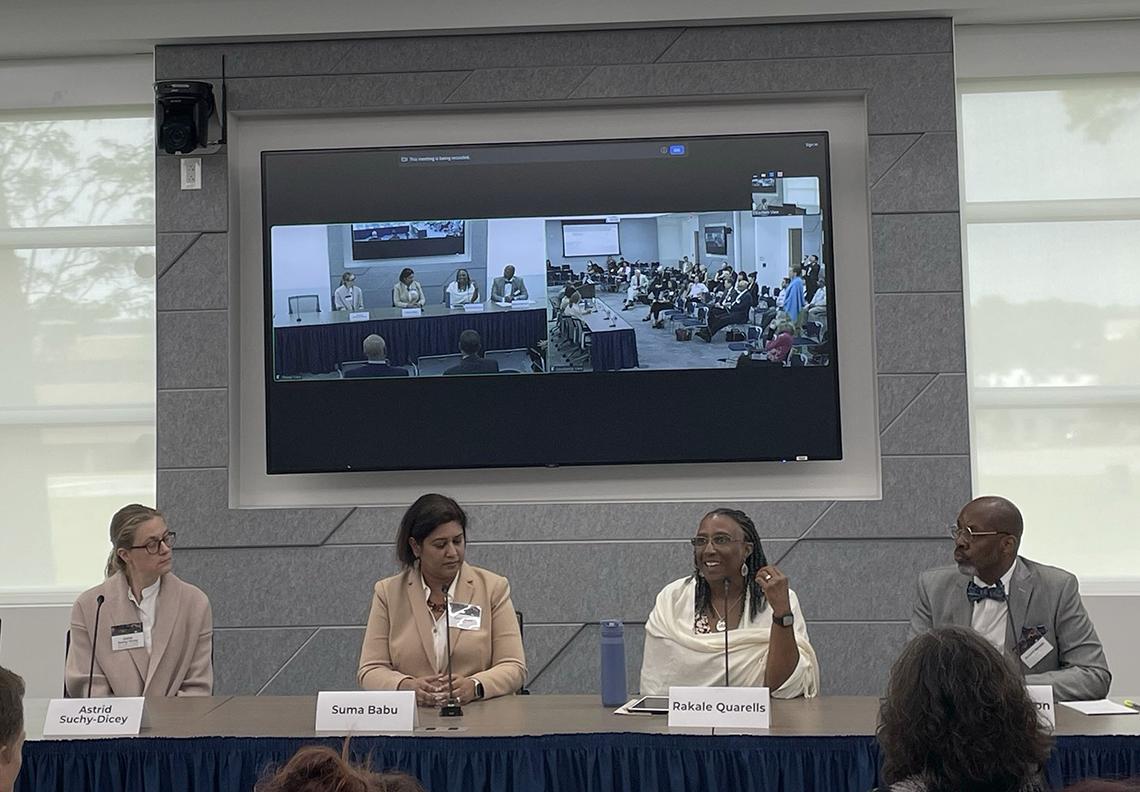NINDS Nonprofit Forum Encourages Patient Engagement, Empowerment

Photo: REBEKAH CORLEW/NINDS
The National Institute of Neurological Disorders and Stroke (NINDS) held its 18th nonprofit forum, “Progress through Partnership” in July. The forum convened representatives from patient advocacy groups, professional societies, industry, federal agencies and people with lived experience (PWLE) from around the country to discuss the importance of patient empowerment and to explore increased opportunities for patient engagement.
Organized in 2005, the annual forum provides a way for organizations to collaborate and share experiences and information with each other, and for NINDS to learn how to more effectively work with patient advocacy groups to address research needs and challenges.
“This is probably the best meeting of the year for NINDS. It’s fantastic for our staff to mingle with the people we are working for and with,” said NINDS Director Dr. Walter Koroshetz in welcoming remarks. “It’s a good opportunity for us to talk to folks and learn. It also motivates our staff and, hopefully, generates collaborations that are productive for all our shared agendas.”
The day-and-a-half hybrid meeting, held at the Porter Neuroscience Center, began with a keynote presentation titled, “From Worrier to Warrior: How Community Engagement Gets Me Closer to a Cure,” by author and activist Mindy Uhrlaub. As an asymptomatic carrier of the C9orf72 gene— which causes the rare neurodegenerative diseases amyotrophic lateral sclerosis (ALS) and frontotemporal dementia (FTD)—she spoke about her journey with having a rare genetic disease. Both Uhrlaub’s grandfather and mother had ALS.

Photo: REBEKAH CORLEW/NINDS
“When I received my positive test, I made it my mission to improve the conditions for people like my family members,” said Uhrlaub, who is a founding member of End the Legacy, a nonprofit organization dedicated to the needs of people with genetic ALS/FTD. “When it comes to people at risk of developing rare genetic diseases, collaboration is everything. There’s so much work,” she said.
Following the keynote, Dr. Richard Benson, director of the NINDS Office of Global Health and Health Disparities, moderated a special panel focused on “Increasing Patient Participation and Engagement in Rural and Minoritized Populations.” Presenters in the session addressed the unique needs of engaging individuals that are not adequately included in the research process.
“Getting insight from community members can improve the science, influence the research questions and makes our research more relevant,” said panelist Dr. Rakale Quarells, professor of Community Health and Preventative Medicine at Morehouse School of Medicine. She was joined on the panel by Dr. Suma Babu, a neurologist specializing in ALS research at Massachusetts General Hospital and Dr. Astrid Suchy-Dicey, principal investigator of the Brain Aging Study at Huntington Medical Research Institutes.
This year’s meeting included several panel discussions, and multiple occasions for attendees to connect with each other during networking and poster sessions and with NINDS during a “meet and greet” opportunity with program staff.
In “Engaging Participants as Partners in Research: Data and Its Use,” panelists discussed the importance of involving patients and their advocates in the research process, particularly regarding how patient data is used.
“We recognize there isn’t a one-size-fits-all approach here and that engagement needs to be tailored to the needs and experiences of both people and communities themselves,” said moderator Dr. Adam Berger, director of the Division of Clinical and Healthcare Research Policy in NIH’s Office of Science Policy. “It’s critical we recognize that it truly is research participants who empower the research enterprise by entrusting us with their data and by holding us accountable to how that data is used.”

Photo: Shannon Garnett
During the “Artificial Intelligence (AI): Opportunities and Challenges for Nonprofit Organizations and Patients” session, speakers from various backgrounds including researchers, academia and PWLE, shared timely information about the ethics and challenges of AI.
Panelist Laura Adams, a senior advisor at the National Academy of Medicine, mentioned four things that differentiate AI from other digital advances: Speed, scalability, ubiquity and democratization. “All of these things make it (AI) extremely difficult to govern and regulate. It is without question outpacing our capacity to govern it. We can’t even get ahead of it to understand it fast enough to regulate it,” said Adams.
On day two, NINDS Acting Deputy Director Dr. Amy Adams shared four key themes heard throughout the forum—accountability, inclusion, equity and trust. She emphasized NINDS’s renewed focus on building trust.
“Our mission is focused on improving the neurological health of all people. We have to find better ways to engage with all people throughout the research process,” Adams said. “I think collectively the direction is moving toward a more partnership-based research model. Thank you for engaging with us as partners as we move forward.”

A discussion on “Engaging Patients Throughout the Clinical Trial and Drug Development Process” led by Louise Vetter of the Lupus Foundation of America, explored the opportunities, hurdles and ethics of collecting, sharing and using patient data.
The meeting concluded with a forum favorite, “Success Stories: Co-Learning Amongst Nonprofits.” The panel, moderated by Jennifer French, executive director of Neurotech Network—featured several presentations on how advocacy ambassador programs help nonprofit organizations and PWLE learn about and understand research and the clinical trials process so they can become more engaged partners.
For more information on the NINDS Nonprofit Forum, including recordings of the 2024 meeting, visit https://www.ninds.nih.gov/nonprofit-forum.
